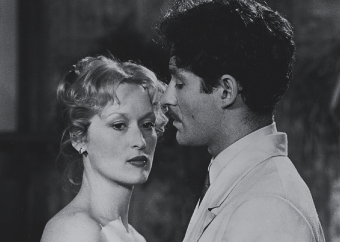Accent Coaching for Actors
 Tuesday, December 11, 2012 at 4:41PM |
Tuesday, December 11, 2012 at 4:41PM |  Ana
Ana 
Meryl Streep and Kevin Kline in Sophie's Choice (1982)
Any screenplay set in another country inevitably involves the need for accent coaching whether there are native English speaking actors involved who have to sound convincing in another language (Sir Ben Kingsley in The House of Sand and Fog or Meryl Streep in Sophie’s Choice) or casting native speakers of the foreign language in question (Persian speaking actors in Argo -commonly referred to as “Farsi”– though this actually is the word used in Persian to refer to the Persian language).
Ben Affleck’s latest feature film, Argo, tells the story of the beginnings of the Iranian revolution and its impact on the American embassy and its employees in 1979 Tehran. When background artists (aka extras) were in charge of chanting slogans in Persian, it was somewhat believable and those multitude scenes worked. However, in some of the minor speaking parts, Persian and Dari became indistinguishable (for instance, the Canadian ambassador’s housekeeper’s name, Sahar, spoke Dari; yet we were never given any hint throughout the film that she was from Afghanistan and not Iran). The devil is in the details. Or, suddenly, one of the revolutionary guards had a Dari accent instead of a Persian one. The audience member able to tell the difference was left wondering if Hollywood cared about such subtleties as much as the importance of continuity or location-hunting. This is when an accent coach on set becomes of utmost importance because in a sense they are the keepers of continuity in language and speech, not to mention delivery (accent).
If you are playing the part of someone with a different linguistic make up, you need a coach to guide you in the right direction so that your intonation and stress patterns are in place and believable to the native speakrs of that language.
In The House of Sand and Fog directed by Vadim Perelman, Sir Ben Kingsley plays the part of Bahrani, the Iranian general who goes to all lengths to maintain the life style and dignity that displacement in the form of exile ensures is stripped away from him. Sir Kingsley has very few lines or words in Persian (most of his lines require that he speak English with a Persian accent). However, towards the end of the film, he has to utter a word twice when his teenage son is shot. At this point, he is to howl out of grief and despair: “Pesaram! Pesaram!” (“My son! My son!”). Instead of placing the word stress on the first syllable and potentially continuing to be believable (something a native speaker would do without thinking), the utterance sounded the opposite “pesarAM”, with the weight of the word at the end of the word rather than the beginning. At that moment, Sir Kingsley’s eternally-revered talent, at all times capable of taking us with him on any journey, from Ghandi to Don Logan, came to a screeching halt. Why? Because we ceased to believe; because if we, the audience, understand, pardon and accept certain necessities for the movie industry to continue existing with its set of standards (having to use a star name to play a part for which native talent exists for financial reasons) we accept it, ride along and even enjoy and applaud the performance with awards. After all, aren’t actors supposed to challenge themselves? Play parts that are as different as possible from them? Work on acquiring the accent needed to sound convincing in a foreign language? And, aren’t production companies aware that the need to hire seasoned accent coaches to work closely with actors is paramount to the overall success of the project at hand? That it is a part of the filmmaking process that can’t be left behind?
The same is true of The Stoning of Soraya M. How are we to believe the protagonist is indeed a villager who is a native speaker of Persian when she suddenly speaks with a western foreign accent?
Here is the ultimate question: Shouldn’t attention to speech and accent coaching on set be an integral part of building a character, of the film process? If so, why do we see such inconsistencies in Hollywood productions? Just like costume, set and make-up designers are an important part of the filmmaking process, in charge of their field of expertise, we need to ensure an accent coach is present to help actors get closer to the intonation, pronunciation and word stress that will complete their performance and ultimately benefit the film as a whole. The future of filmmaking might have this prediction in store.
